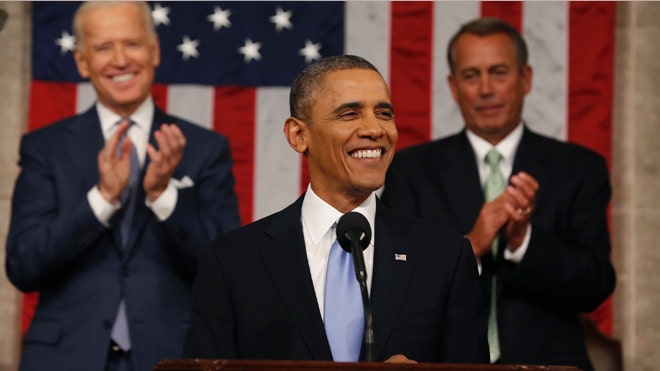
By Matt Kibbe
In his State of the Union address, President Obama reaffirmed, to great applause from his Democratic colleagues, his promise to make 2014 a “year of action.”
Despite the obvious harm caused by his administration’s single-minded implementation of ObamaCare, he plans to pursue his ideological agenda on his terms, regardless of the consequences to the rest of us. And, as he said repeatedly throughout the speech, he’ll do this by taking matters into his own hands, ruling by decree when the other branches of government disagree with him.
For those who have been following the president, this is not news. Before the speech, Press Secretary Jay Carney told reporters
 , “The president sees this as the year of action, to work with Congress where he can, and to bypass Congress where necessary.”
, “The president sees this as the year of action, to work with Congress where he can, and to bypass Congress where necessary.”Several weeks before that, Obama stated
 in a cabinet meeting: “[O]ne of the things that I’ll be emphasizing in
this meeting is the fact that we are not just going to be waiting for
legislation in order to make sure that we’re providing Americans the
kind of help that they need. I’ve got a pen and I’ve got a phone.”
in a cabinet meeting: “[O]ne of the things that I’ll be emphasizing in
this meeting is the fact that we are not just going to be waiting for
legislation in order to make sure that we’re providing Americans the
kind of help that they need. I’ve got a pen and I’ve got a phone.”With his pen and his phone, Obama has made it clear that he will brook no insolence from a Congress he sees as standing in the way of his policy agenda.
Our nation was built on the idea of government “by the people,” not by one man.
His justification for this unilateral approach to governing is the allegation that Republicans in Congress are being obstructionist purely for the sake of obstruction, holding the government hostage to their “extreme” demands.
In reality, this is no justification at all.
The American system of government was intentionally designed with three equal branches, meant to serve as checks and balances to one another to prevent the excessive expansion of government power.
When one branch is not acting in accordance with the wishes of the other two, this should be taken as a signal for more negotiation, more debate and more consensus, not mere railroading that undermines the legislative process as laid out in the Constitution.
Congress is unique in that it contains representatives from every state, allowing the individual needs of different regions of the country to have a voice in the political process. Only 62 million
 of the more than 317 million
of the more than 317 million Americans voted for Barack Obama in 2012. Congress provides an
opportunity for the remaining 255 million to have a say in the process
as well.
Americans voted for Barack Obama in 2012. Congress provides an
opportunity for the remaining 255 million to have a say in the process
as well.By using executive authority to bypass Congress, Obama is effectively disenfranchising a majority of Americans, whose elected representatives have been rendered toothless by the president’s overreach.
This is not the first time in history that presidents and legislatures have been sharply divided by differences of opinion. In the past, however, the importance of the lawmaking process was recognized, and consensus was reached through negotiation and compromise.
Obama’s failure to effectively negotiate with Congress—a Congress, it should be added, that has many legitimate grievances with his policies—doesn’t give him license to become a dictator.
Obama’s speech indicates, more than anything else, his disdain for the American system of governance. For over two hundred years, America has rejected the idea of the autocrat.
Our nation was built on the idea of government “by the people,” not by one man.
Once we allow our presidents to behave like kings, the journey down the road to serfdom will be a short one indeed.
No comments:
Post a Comment